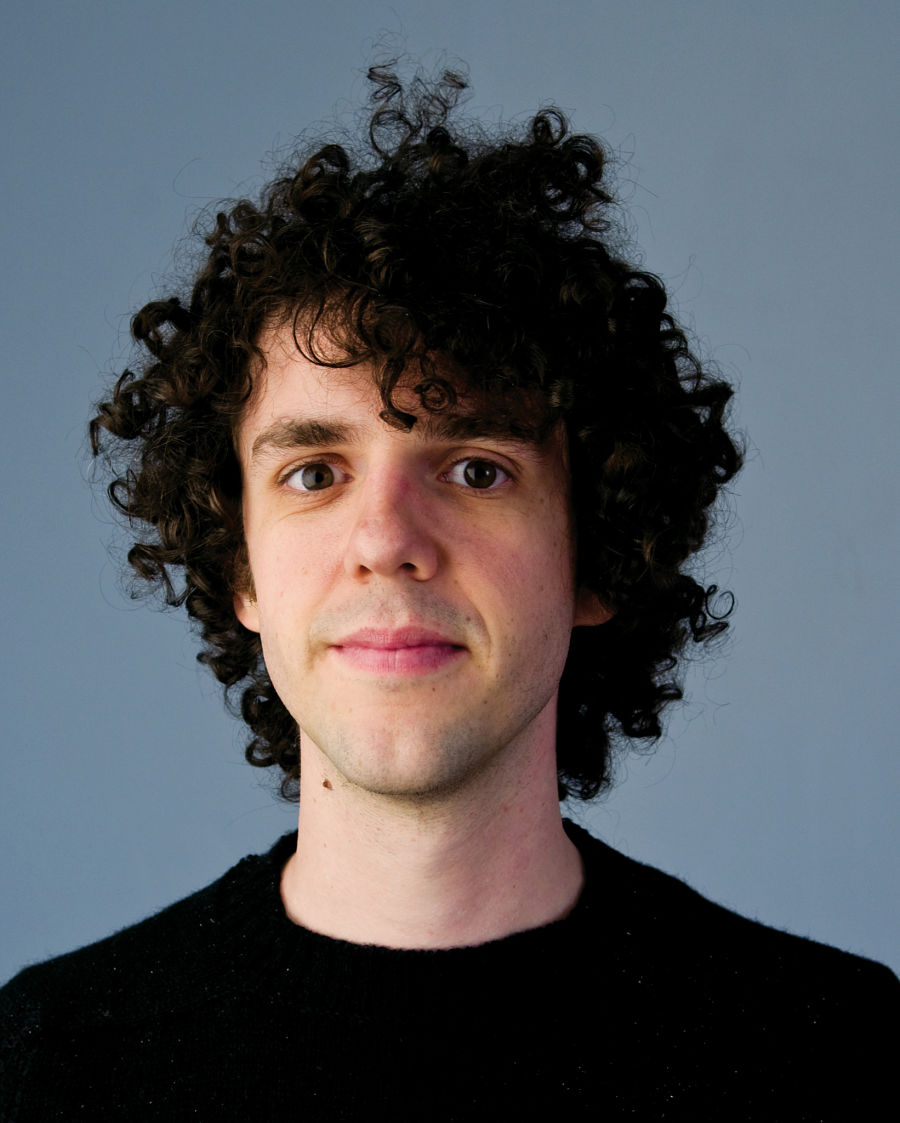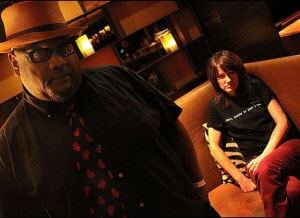PHILADELPHIA: It’s hard enough to get a new musical staged these days, but what about one where the teenage protagonist opens the show by downing a bottle of pills, along with “a list of the ways my life is no longer livable”?
“Haven’t you ever been faced with a feeling of void?” the suicidal Alameda sings in the opening number of César Alvarez’s latest creation for the stage, The Elementary Spacetime Show, which appeared for one night only last week at Philadelphia’s historic Merriam Theater as part of the University of the Arts’ Polyphone Festival (March 24–28).
“You wish you could die and it wouldn’t make everyone so sad,” sang Alameda (played by UArts freshman Julia Louis), facing an audience seated at the back of the Merriam’s stage, the ornate cavern of the theatre’s empty house looming behind her.

Alvarez, frontman of the band The Lisps and also the festival’s artistic director, in collaboration with Ira Brind School of Theater Arts director Joanna Settle, said he believes that the musical’s “heightened form” is a powerful way to address such taboo thoughts.
But just what is a musical, right now, today, in American theatre? And how is it being born and reborn?
“I’m a composer at a midpoint in my career, where I’m trying to figure out—here’s all the musicals I’ve written, how do I get them onstage?” Alvarez asked, hanging over one of the seats of the Merriam during tech a few days before Polyphone, which featured five one-night-only musicals over five days: Sondheim and Wheeler’s A Little Night Music, Brecht and Weill’s The Threepenny Opera, and three new works.
Alvarez is fortunate in his current collaborator. “Everyone’s terrified it’s so expensive,” he started to say, referring to the cost of mounting a new musical—at which point Settle, perched a seat away in the row behind him, threw her hand in the air like a straight-A student.
Settle is game. She’s not afraid to put her energies—and the talents and resources of the Brind school—behind the question of what a musical is today. That’s the beauty of working with a university, she pointed out, rather than a traditional theatre company. For one, with an educational mandate, it’s not about the ticket sales.
“I want to run it all through everybody’s home and the streets for free, naked,” she added of the fest (free to the UArts community), where tickets cost just $10 for adults and $5 for students and seniors.
“Plurality is the ballgame,” Settle continued. “Flexible thinking and plurality. The real question for the students is, What’s the musical you’re going to write? What’s the piece you’re going to make?” She loves it, she conceded, when her students see traditional success in a Broadway cast, but “life in the musical theatre doesn’t have to be going to auditions and hoping you get cast in a tour. What are you going to invent?”
She said the diversity of her own students’ interests was the genesis of the whole festival.
“When I met with the musical theatre students, they were like the medium is now,” she said of taking the helm at Brind just over a year ago and learning what the students were “hungry for.”
“These ones wanted to make new work, these ones wanted to be in a production of Oklahoma! with the original choreography, and these guys wanted to make a devised jukebox kind of a thing.”

So instead of mounting one musical, she decided to leap into a festival of five: two standards with a twist (the Sondheim staged with double baby grand pianos, the Brecht sung right into the mic); plus three in development. Elementary Spacetime Show was directed by Andrew Neisler, and Gordon Leary and Julia Meinwald’s Pied! (directed by Benjamin Kamine) appeared alongside Stew and Heidi Rodewald’s latest, The Total Bent, which Settle directed. Mounted in association with New York’s Public Theater, Bent will get its full premiere there next season.
Polyphone’s shows weren’t fully staged creations, but with professional direction and design and an impressive mix of student and high-profile professional New York talent (including Salty Brine, David Cale and Vondie Curtis Hall of Dreamgirls fame), they weren’t no-frills read-throughs, either.
“What if we created a whole different kind of step for musicals to be born through, that is not a reading, and it’s not a fully staged boondoggle production?” Alvarez mused of the two-month, three-day-per-week rehearsal process.
So what exactly would you call the Polyphone shows?
“A concert,” Settle said.
“A super-theatrical concert,” Alvarez elaborated. “It’s fully embodied as a work of art.”
But flexible, too—both artists said that performers in Total Bent could expect new pages on the day of the performance, with Stew himself at the keys and guitar.
“Stew’s going to be at that piano rewriting the music while it’s playing,” Settle laughed. On March 28, when The Total Bent hit the stage, Settle told the crowd in her curtain speech there were new things going in that afternoon, so the performance was actually the first run-through of that particular draft.
It’s an immersive experience for the students that redefines theatremaking day by day.
“They’re seeing an approach to performance that is brave and free,” Settle explained. “If the prop isn’t there, it’s an opportunity for something to happen. If you exit the wrong way, it’s on now. If you don’t make it to your mic, you better dance your way over to the mic, because the chorus is only going to come around one more time.”
For Alvarez, a big part of Polyphone’s appeal was the chance to explore the new frontier of performer as maker, which is starting to reintegrate musical theatre into America’s larger musical landscape, instead of typing and “silo-ing” it as a separate genre.
Alvarez said he doesn’t enjoy walking into a Broadway theatre to see “25 people only singing something that they’ve been programmed to. It can feel very militaristic or corporate, in a way that is a little bit at odds with the super-non-linear quality of our culture right now.”
What does he mean? Let’s say you’ve got a song stuck in your head, he said by way of illustration. Type it into Google and you may end up watching a random cover of it sung by a teenager half a world away.
As Alvarez sees it, “That’s the way our culture is being created right now—this sort of haphazard, random, fungal way. Allowing that into our educational process, for me, is just super-exciting.” Out of 120 students in Brind’s four theatre programs, he said 87 are involved in the festival, in tech, design, and performance.
In today’s world of social authorship and the artist as entrepreneur, Settle said, “We’re making the medium and how it gets produced, and who the audience is and what the location is…This may be a time when we need to speak for ourselves as artists.”
“I hate singers but I write songs,” Total Bent’s young Marty Roy declares, before he finds his own voice at the mic. “Singing and dancing is just writing in the moment,” he discovers later.
Alvarez, in addition to taking the stage briefly with his sax, watched Elementary Spacetime Show while playing his guitar from the audience, with the rest of the show’s band—percussionist Eric Farber, bass player Lorenzo Wolff and keyboardist Andrew Hoepfner—assembled behind the actors.
When Alameda dies by an overdose, she discovers herself in a bizarre “liminal” space (not purgatory) where a cavorting game-show ensemble gives her a choice: Give up, lose or win—and get the chance to decide if she’ll reenter her life, or face the void she longs for. Along the way, she meets Camus and Melville, a modern-day Hamlet, her own mirror-image, the cannibal sailors of the The Essex disaster and an insouciant talking mosquito.
“This fucking game show is not going to make me want to not kill myself, and the game show’s like, we don’t fucking care, because that’s what this is about,” Alvarez said of Alameda’s dilemma. As a line in his musical goes, “The universe doesn’t care if you die. It just doesn’t want you to die as a result of a false impression.”
Facing his own mortal struggles, The Total Bent’s young star, Marty (keep an eye out for UArts senior Aaron Bell, who sang the role), battles the legacy of his gospel-star father, Joe Roy (Curtis Hall), trying to find his own voice after writing the songs that make his father famous in Montgomery, Ala. Through a tumultuous Civil Rights and family story, and dueling records with British producer Byron Blackwell (Cale), the songs of Total Bent set out to redefine music itself, and, as Blackwell puts it, challenge “the hero-centric idea of authorship.”
“Music is just religion without the bullshit,” goes a lyric in Bent, “the entrance hall into God.” It’s “the sound of dying,” but also “the sound of trying to live forever, again.”
It all boils down to one question for his students, Alvarez said. “How is this process right now going to turn into your life? The idea of a creative education is one of the most valuable things in the world right now, because the last thing that technology’s going to outsource is the creative act.”
That’s why the work of Polyphone, is at its root a deeply practical and empowering experience. It’s an emotional journey, too: both audience and cast wept at the closing notes of Elementary Spacetime Show.
Did Alvarez have anything to add after the standing ovation, his cast singing through tears? “No. I’m gonna go hug ‘em.”


